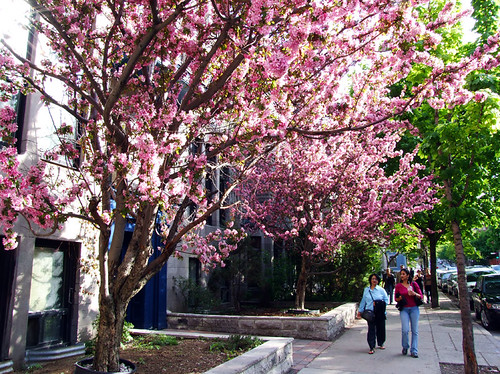Over the holidays, the Tyee, a Vancouver-based webzine, published a series of twelve “New Ideas for the New Year.” Here’s one that really caught my attention: planting fruit trees on city streets.
While the benefits of greening the city are well-known — street trees provide shade, suck up storm water, remove carbon from the atmosphere and reduce the urban heat island effect — the notion of actually eating the things we plant in our streets is still quite novel. By doing so, however, we would gain an important local food supply and a way to bring people together.
That has been the experience of the Edible Campus, a container garden on McGill University’s downtown campus that I wrote about last November. Over the course of last year’s growing season, it produced one third of the food needed by Santropol Roulant, a meals on wheels service, and drew together a diverse group of volunteers who helped maintain the garden.
What really struck me, though, was the way that ordinary passersby used the garden. People make a point to pass through what had previously been an barren concrete space between a Brutalist highrise and the entrace to underground lecture halls. They stopped to examine the plants, sat on the benches near the garden, and walked through a wood archway that had been erected in the midst of the containers. Little kids were especially delighted when they ran around the garden, which must seem more like a forest when you’re three feet tall.
Fruit-bearing street trees could have a similar effect. Cultivation would be a communal activity; imagine a neighbourhood apple-picking festival. The Tyee goes even further by suggesting that fruit trees could reinforce neighbourhood identities and immigrant cultures, much in the same way that community gardens allow people to plant varieties of fruits and vegetables that are hard to find in Canada.
In Vancouver, the parks commission has already started planting 600 fruit trees in city parks; community groups will harvest the fruit when it’s ready in three to five years. Meanwhile, the Fruit Tree Project arranges with homeowners to collect fruit from under-picked trees on their property. The harvested fruit is donated to community kitchens and people in need.
Here in Montreal, there is a far more limited variety of fruits that could be grown. Still, climate would not be as much an obstacle to fruit trees as the risk of neglect and mistreatment. For years, street trees weren’t given enough space to grow, and many sidewalk planters were left unprotected by grates, as anyone who has tripped into one can attest.
Since it passed a “Politique de l’arbre” in 2005, the city has cleaned up its act, but Montrealers haven’t: hundreds of trees are killed each year because of vandalism.


6 comments
I’m not sure how great of an idea this is as the type of tree that can be planted along streets is rather limited. The harsh conditions of growing in such an urban area allows only the hardiest and most versatile of trees to be planted. Edible fruit trees are some of the most delicate because they have been bred in orchards where they have constant care, and their selected traits are definitely not versatility (of soil type, acidity, salinity, water requirements, etc etc.)
In the Plateau there’s a mulberry tree right on the street that produces luscious fruit. So it’s possible.
Also, for some years the city’s been planting decorative brassica in places where it’s responsible for the floral landscaping. Some places, half the stuff in the landscaping is edible, although either most people don’t know it, or we’re not hard up enough to steal the fancy kale to put in the soup pot.
I grew up in northern California in a semi-urban situation and there were fruit trees everywhere. Obviously, the climate is much more conducive to it there and there are no snow plows to crash into them. The municipal tree seemed to be the plum tree and they were loads of fun to climb in and just eat their fruit.
At the very least, I’m so happy to see these kinds of movements being taken seriously and not immediately undermined by some bourgeois town council that’s freaked out about rotten fruit lying on the ground in the spring time.
The types of fruit trees that will grow here may be more varied than you think. I’ve planted an asian pear and an apricot tree in my backyard, though it’ll be a couple years to see how well they will fruit. I’m more confident about the former as I purchased it from an organic farm on Ile Perrot (Windmill Point Farm).
You will notice that in Vancouver they’re planting fruit trees in the parks not on the streets. One reason is that urban foresters try to avoid planting “messy” trees on the streets. If you’ve ever walked around a crab apple tree with oodles of rotting fruit underfoot, you can understand their reluctance.
NOW THAT A GREAT IDEA!!! WHY NOT PLANT FRUIT TREES.